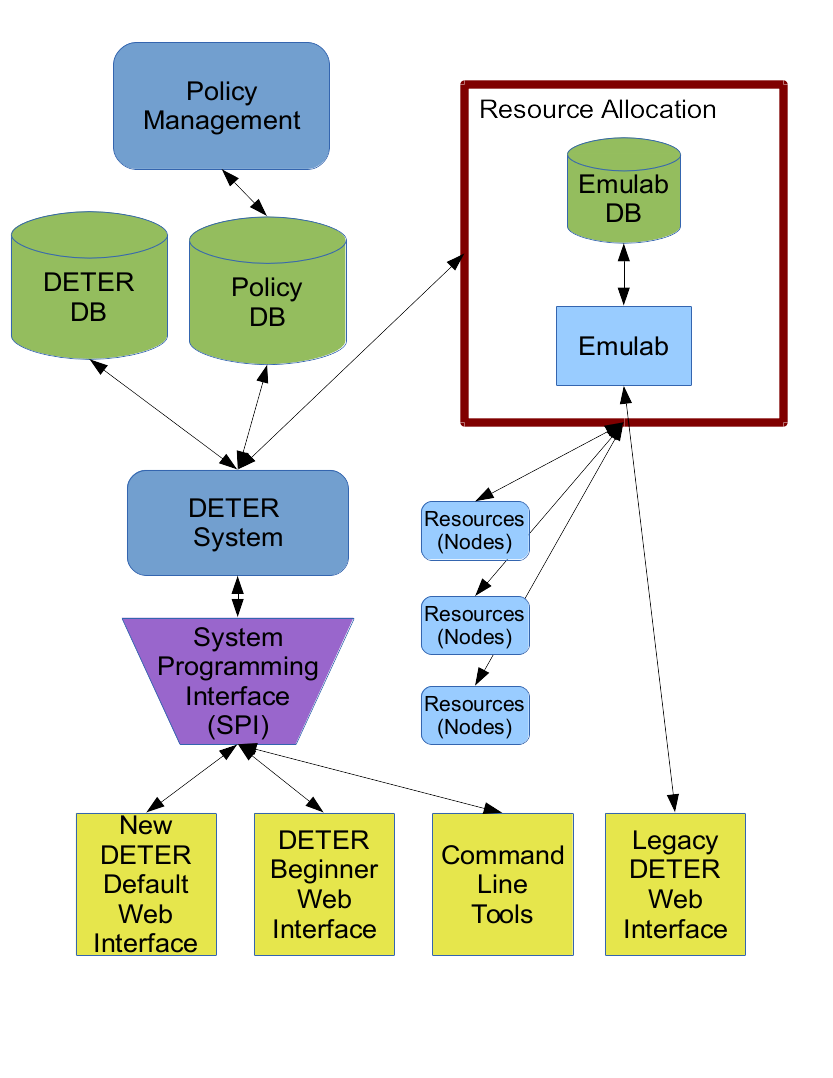| Version 4 (modified by , 10 years ago) (diff) |
|---|
The DETER System Programming Interface
Table of Contents
Introduction
The DETER System Programming Interface (SPI) is a standard interface for manipulating fundamental DETER abstractions used to manage testbed resources and to marshall those resources into network and cybersecurity experiments. The SPI is analogous to an operating system's system call interface. It provides the fundamental abstractions that enable application programmers to make tools that are useful to researchers.
There are two motivations for building the SPI: first that the SPI is a context and programming framework for new DETER abstractions that subsumes the existing Emulab codebase cleanly. Second the SPI provides a context in which new developers can extend those abstractions to provide new functionality and to improve their scaling properties.
The SPI is fundamentally a tool-builder's interface. Researchers performing experiments or students performing class exercises are unlikely to access SPI methods directly, though we expect that higher level tools and interfaces will make the fundamental abstractions visible.
The Fundamental Abstractions
There are 6 first class abstractions that make up the DETER SPI. These are:
- Users
- A researcher who builds and carries out experiments using resources controlled by the testbed.
- Projects
- Administrative groupings of users that embody the trust chains that underly researcher access. A researcher has access to the testbed as a whole because they are a member of an approved project. Trusted users can add other users to an approved project, reducing the administrative overhead.
- Circles
- Groupings of trusted users that embody the sharing of data and resources among researchers. Adding or removing users from circles gives them permission to access resources in use for experimentation or excludes them from such resources.
- Experiments
-
A description of a research activity. An experiment is composed of aspects, each of which embodies some facet of the activity. Currently the SPI recognizes 4 aspects:
- Layout: the arrangement and specification of an experiment's elements that make up the experimental apparatus
- Procedure: The steps taken to carry out an experiment
- Data Management: The resources and processes used to collect and process data generated by the experiment
- Constraints: Correctness requirements that must be met in a valid experiment.
- Libraries
- Collections of experiments grouped by function or semantics. Libraries allow researchers to organize their experiments and share them with other researchers (by assigning rights to circles).
- Realizations
- A realization is the binding of resources to an experiment. Users can inspect and modify such bindings in carrying out their experiments.
We describe each of these in more detail below.
The Implementation
This section motivates and explains two of the implementation design decisions that underlie the SPI: expanding the implementation beyond the Emulab abstractions and implementation, and using SOAP and web services to deliver the service.
DETER Abstractions and the Existing Codebase
The DETER research agenda drives the new abstractions, and it differs somewhat from the abstractions that drive the Emulab-derived code base. DETER is interested in sharing experiment infrastructure - including conducting experiments where multiple parties manipulate the environment based on different views of the world and different goals (multi-party experiments). Also, DETER is interested in multi-fidelity, large-scale experiments where the representation of the various partes of the experiment is guided by the researcher's design of the experiment. Finally, we think of experiments as having aspects that go well beyond the definition of the topology or layout, and the abstractions need to support this.
The Emulab code is based on simpler topology and experimentation models, and while its developers have been able to extend it to do more, our changes take the abstractions far enough that relegating the Emulab code to allocating local resources seems the cleanest way forward. Functions including user and project management will move into the SPI, though subsets of that function (basically current Emulab functionality) will remain available through the legacy interface.
As a last practical point Emulab-based codebase blurs the lines of some implementations between the webserver interface and the backend code. Building the SPI offers DETER a chance to solidify that interface and enable developer to build multiple applications on the DETER abstractions.
Delivering the SPI Through SOAP
Attachments (1)
-
SPI_System_Diagram.png (159.2 KB) - added by 10 years ago.
SPI system overview
Download all attachments as: .zip

